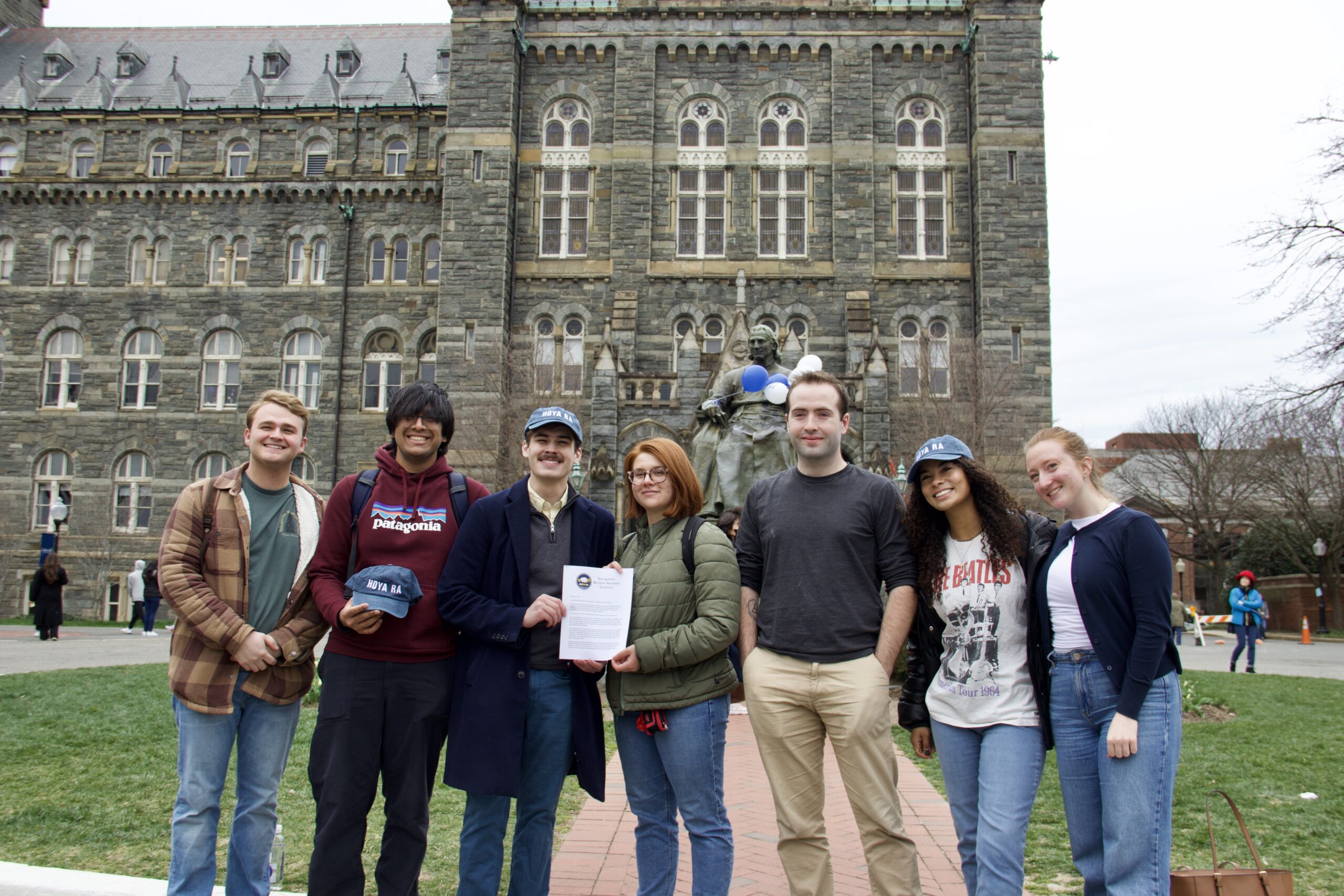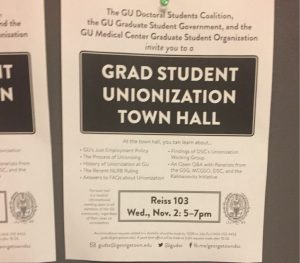The Georgetown Resident Assistant Coalition (GRAC) voted unanimously to ratify their first contract with the University on May 9. This comes a year after Georgetown’s residence assistants (RAs) voted overwhelmingly in favor of unionization, and after several months of bargaining with the university on proposed contract articles.
60 RAs, out of 169 eligible voters, voted unanimously in favor of the contract ratification. The vote required a simple majority to pass. While GRAC was not legally required to include incoming RAs in the process, leaders voluntarily invited them to cast votes.
Included in the four-year contract is a $1,750 semesterly stipend for RAs, in addition to housing and meal plan benefits. This stipend will increase incrementally each year at a similar rate to that of full-time administrative employees.
“I think the stipend aspect of the contract is pretty exciting,” Addison Basile (CAS ’26), who is entering her third year as an RA, said. “I think that RAs do a lot that goes kind of unnoticed sometimes, and it’s great to have that kind of compensation and recognition that RAs deserve.”
The contract also establishes new committees, such as the Labor-Management Committee, which will include five union members and five university representatives to “discuss and resolve problems and processes of mutual concern.”
Ulises Olea Tapia (SFS ’25), GRAC’s interim bargaining lead, said the Labor Management Committee will ensure that both parties feel the contract is being honored and discuss any new initiatives proposed by the university or the union. .
“What this committee is going to be able to do is that it’s going to bring RAs and university officials together to talk about first, the implementation of the new contract, but also the implementation of new initiatives that are able to better align the needs of RAs with the university,” Olea Tapia said.
Sam Lovell (CAS ’25), who founded GRAC in 2024, said the committee also hopes to improve RA and residential staff relations.
“I think that they’ll play a pivotal role in improving the relationship between residential and professional staff and RAs, which right now I’m not sure is very strong,” Lovell said.
The contract also clarified training periods for RAs, limiting them to 40 hours per week with sessions generally occurring from 9 a.m. to 5 p.m. It also established the inclusion of RAs on the university’s RA training committee and sets aside time for union orientation during these designated training days.
The University and RAs agreed to a “no strike/no lockout clause,” stipulating that GRAC could not encourage RAs to strike or disrupt work, and in return the University would not retaliate against RAs by limiting access to work (their dorms). The contract also outlined RA’s roles and the sanctions that they could face if they did not meet expectations or violated policies in any way, ranging from probations to terminations.
41 RAs voted in the leadership election, electing Izzy Wagener (SFS ’26) as chairperson, Isaiah Vasquez (CAS ’27) as vice chairperson, CC Mesa (SFS ’26) as organizing lead, and Victoria Allen (CAS ’27), Kristen Delancy (CAS ’26), and Anna Holk (CAS ’27) as stewards.
Olea Tapia said that stewards will be essential to enforcing the contract, which is an important step in sustaining the current unit’s bargaining efforts. Stewards are members who can represent RAs during investigatory interviews and disciplinary hearings regarding performance concerns for current RAs, as well as grievance meetings and arbitrations, which concern disagreements between RAs and the university.
“Stewards are a key part of any union. They ensure that the contract is being followed and they keep close contact with union membership,” Olea Tapia said.
On May 5, GRAC leadership sent the university’s proposed contract to all current RAs as well as those hired for the 2025-2026 academic year. Olea Tapia said it was important to include all RAs for the upcoming school year in the ratification process.
“We want the incoming RAs as well as the outgoing RAs to be able to vote in the ratification of the contract, and this comes as a true commitment to having every RA’s voice heard,” Olea Tapia said.
Grace Ye (CAS ’27), an incoming RA, emphasized the importance of new RAs having a say in the contract.
“I’ve always heard of issues when it comes to RA contracts and how important unionizing has been, considering all of the issues that have come up between RAs and their [community directors],” Ye said. “I’m happy to—in my incoming year—to be in a space where I actually do have a voice.”
The contract is also the first of its kind— GRAC is the only RA union in the D.C. area or in Georgetown history.
“We’re the first RA union in the DMV area. We’re also the first to negotiate a full contract, a full first contract. And I think that is going to set the stage for RAs in four years to be able to negotiate an even better one,” Olea Tapia said.
David Hamer-Hodges, the director of organizing at Office and Professional Employees International Union (OPIEU) Local 135, the union that represents GRAC, told the Voice that undergraduate RAs historically have not been recognized as workers and haven’t been prioritized in local unionization efforts. He said that he is proud that OPIEU has made an effort to uplift student unionization efforts and represent them in negotiations.
“In a lot of circumstances, there weren’t unions that had the vision to take on this type of importance,” Hamer-Hodges said. “I think that’s an important aspect of this, is that [student RA unions] didn’t have a home previously. And to a certain degree, Local 153 in particular, has made itself a bit of a home for undergrad workers in that respect, particularly RAs.”
Aside from GRAC, Local 153 also represents the University of Pennsylvania’s RA Union and Drexel University’s RA union.
The ratified contract will now last for four years instead of the initially proposed two years, which means none of the RAs in the current unit or next year’s unit will be involved in the next bargaining session. Wagener said that despite a potential lack of experience, she was not worried about the next bargaining unit of RAs.
“The people who will be bargaining the next contract, none of them will have been there for the first bargaining process. But all of us who were negotiating it this year also had no experience. So I don’t think it’s an obstacle that can’t be overcome. And I think that I’ll definitely be trying my best to pass down all the things that I learned doing it this year,” Wagener said.
Note: Izzy Wagener is the photo editor at the Voice
Despite the lack of current RAs in the next bargaining unit, GRAC intends to keep institutional memory through its worker-centered organizational structure.
“There will be basically no institutional memory for that other than myself or, you know, if I’m no longer in the job, then whoever comes after me. And so the best way to do that is internal organizing. To make sure that the people that are here are constantly doing the work of being a labor union, understanding how to build power, of understanding how to keep organizing, keep people engaged, keep that sense of solidarity,” Hamer-Hodges said.
“I can be there to help guide that circumstance to a certain degree, to help advise that to a certain degree, but ultimately, the only thing that gets a good, strong contract is the workers,” he added.
Olea Tapia emphasized the importance of student journalists in upholding institutional memory of GRAC’s bargaining efforts.
“Student journalists have also been great allies and also a way in which we can keep institutional memory,” Olea Tapia said. “I envision future GRAC members who are going to be negotiating the next contract and contracts afterwards to be reading the articles that have been written about negotiations to understand, in many ways, how negotiations work.”
According to current RAs, GRAC’s bargaining process with the university gave them a sense of recognition and a voice.
“A lot of the things that I didn’t like about this job or that made this job difficult for me were feeling like I had no voice in this role. And so I think bargaining the contract actually helped me along with that,” Wagener said.
Devan Varma (CAS ’26), who has been an RA for two years, echoed this sentiment.
“Because there’s always gonna be somebody to replace the RA position, we feel like we’re kind of disposable,” Varma said. “This gives us some power, some agency, and at the very least just know that we are recognized and have some kind of community amongst RAs to collectively bargain when we need to.”
Continuing RAs who attended the voting session said they are excited about the future of GRAC beyond its current bargaining efforts.
“I think they have the opportunity to—now that they don’t have to focus on bargaining as much, they can focus more on, like, community building among RAs and things like that, which I think will be really awesome,” Basile said.
Basile also said that GRAC has been an important part of the community and social aspect of being an RA.
“I think this has helped bring RAs together with more solidarity and more community among us, which is nice,” Basile said.
Reflecting upon the bargaining process, Olea Tapia said RAs were able to build an effective working relationship with the university.
“I think that something that truly sets GRAC apart is that we never aimed, and we would never aim, to be adversarial to the university,” Olea Tapia said. “ I think that the working relationship that we established was extremely productive and good for both the university in general and for RAs, and for every student on campus. I think that we always came to the table with the common understanding that both sides wanted to do what’s best for Georgetown as a whole.”
A university spokesperson wrote to the Voice that the university is thankful for the collective efforts of GRAC and the university to come to an agreement.
“The University values the contributions of our Resident Assistants and has worked in good faith with OPEIU to negotiate a collective bargaining agreement. We are pleased to have reached an agreement. We are grateful for the leadership and collaboration shown by all parties throughout this process,” the spokesperson wrote.
RAs involved in GRAC’s bargaining process reflected on the past year of negotiations, saying that while the efforts were at times difficult, they were all made worth it.
“I think this whole process has just been a bit emotionally taxing for sure,” Wagener said. “I think it has been a lot to sort of think about how how to continue sort of working in this job that I love but also simultaneously has brought me a lot of a lot of stress but I think really the union was played a really big role in helping me overcome that and helping me have a more positive outlook on what the RA experience could look like.”
Lovell said the union has been influential both personally and professionally for him.
“I’m really proud of the gains that we’ve made, a year on. I think that it’s been a really great process personally for me, and I know for a lot of my colleagues as well. But professionally too, it inspired the creation of my thesis and also the kind of law that I hope to practice,” Lovell said.
Although Lovell will not experience the new RA contract firsthand, he is still hopeful for the future of GRAC and student workers on campus.
“I’m really grateful for the experience of standing hand in hand with other people and a context that was, you know, in some sense confronting an injustice on campus,” Lovell said. “There were lots of tears. There were lots of hard days, but ultimately, I’m really grateful for the opportunity to be in solidarity with other students on this campus, fighting for some vision of what is right and what is good.”
Aubrey Butterfield contributed reporting







